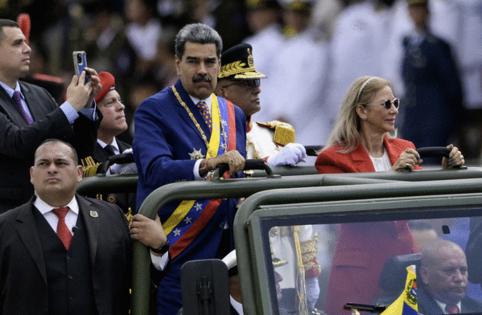Former marine freed in Venezuela-US prisoner swap was convicted of triple murder
Published in News & Features
One of the 10 American citizens or residents freed by the government of Nicolás Maduro in a recent high-profile prisoner exchange with the United States was a fugitive convicted of a triple murder in Spain, according to reports by Venezuelan and Spanish media outlets.
Dahud Hanid Ortiz, 54, a former U.S. Marine born in Barquisimeto, Venezuela, was convicted of killing three people in Madrid in 2016. He was sentenced by a Venezuelan court to 30 years in prison on July 22, according to court documents and statements by the victims’ families.
Ortiz, who holds U.S. and German citizenship, was among those repatriated to the United States on July 18 as part of a prisoner swap. The deal involved the release of 252 Venezuelan nationals who had been held in a maximum-security prison in El Salvador, many of them accused by U.S. officials of allegedly being criminals or part of the feared Tren de Aragua gang.
Ortiz is currently believed to be in Texas, where he landed after his release. As of press time, the U.S. State Department had not provided information about his legal status, or whether he remains in custody.
A former combat veteran, Ortiz served in Iraq and South Korea and was awarded the Purple Heart. However, he was dishonorably discharged from the U.S. Army after being found guilty of falsifying documents related to his residence and military record.
After being discharged from the marines, his personal life unraveled. His relationship with a German doctor, Irina Trippel, crumbled, and when she began a new love life with Peruvian lawyer, Víctor Yoel Salas Cobeñas, the former Marine reacted with obsessive fury.
On June 22, 2016, Ortiz executed a meticulous and bloody plan in Madrid, according to court documents. He showed up at the lawyer’s office and, mistaking an Ecuadorian client for his romantic rival, murdered him.
He then attacked and killed two women who worked in the office: Maritza Osorio Riverón, a secretary, and Elisa Consuegra Gálvez, a lawyer and Salas’s partner. Before fleeing, he set fire to the office and left a fake business card with the logo of a supposed Mexican cartel, attempting to mislead the investigation.
Following the attack, Ortiz fled Spain. An international arrest warrant was issued, and he was eventually detained in 2018 by Venezuelan authorities during a routine security operation in the state of Bolívar. For years, Ortiz was held in the Caracas headquarters of Venezuela’s Military Counterintelligence Directorate, initially under suspicion of espionage.
In December 2021, Venezuelan and international media revealed Ortiz’s identity and the charges against him. According to media reports, he had been using false identities and speaking multiple languages while detained, including Spanish, English, German and Russian.
He was tried and sentenced in Venezuela rather than in Spain for the crimes committed in Madrid because the Venezuelan Constitution prohibits the extradition of Venezuelan-born citizens, but the country’s laws allows Venezuelan citizens to be prosecuted for crimes committed abroad.
Ortiz was sentenced in January 2024 to 30 years in prison, the maximum sentence provided for in Venezuelan law, on charges of homicide and arson.
On June 1 of this year, Ortiz was removed from his cell and taken to a separate location where he recorded video messages addressed to U.S. officials, claiming to be in poor health and without access to food or medicine. Sources familiar with the situation said he was instructed to follow a prepared script.
The decision to include Ortiz in the prisoner exchange has drawn criticism from relatives of the victims. Salas, the Madrid-based attorney whose law office was the site of the attack, spoke publicly after receiving confirmation of Ortiz’s sentence.
“We all feel deceived, betrayed and defrauded,” Salas said during an interview with the Spanish television program Vamos a Ver. “Dahud Hanid Ortiz was never a political prisoner. He was a convicted and sentenced murderer. The court documents make that absolutely clear.”
Salas also questioned the involvement of former Spanish Prime Minister José Luis Rodríguez Zapatero, who reportedly played a mediating role in the negotiation between Venezuela and the United States. He urged all parties involved to take steps to acknowledge and rectify what he described as a miscarriage of justice.
_____
©2025 Miami Herald. Visit miamiherald.com. Distributed by Tribune Content Agency, LLC.







Comments